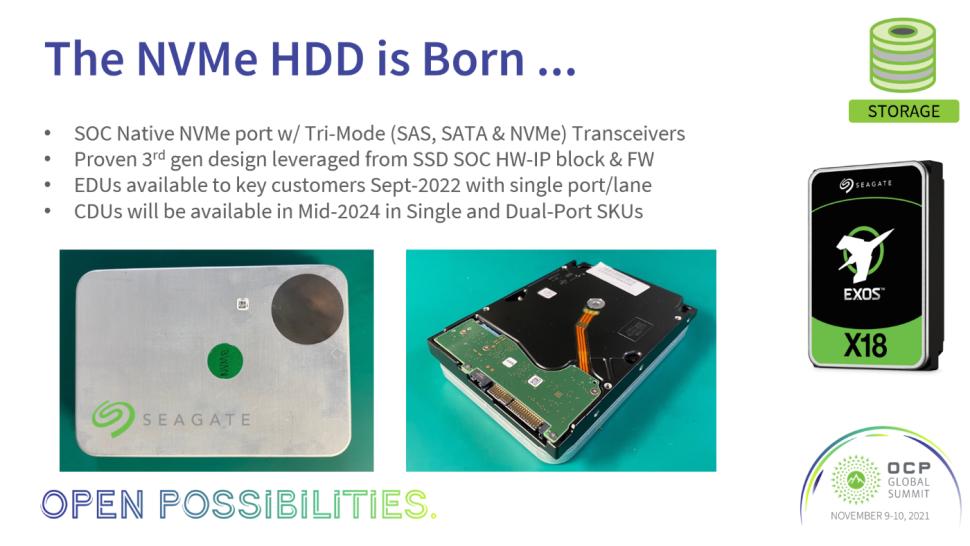Seagate Demonstrates HDD with PCIe NVMe Interface (Updated)
Update 11/16/2021 03:58 PT:
Seagate has indicated that the first commercial NVMe hard drives will not ship in 2024. This information has been added to the main story.
Original Article

Seagate has demonstrated the industry's first hard disk drive connected to a host using a PCIe interface at the Open Compute Project Summit. Like solid-state drives, the experimental hard drive uses the NVMe protocol to operate alongside SSDs seamlessly. Usage of a single protocol for different types of storage devices will greatly simplify datacenters.
The experimental SSD is based on Seagate's proprietary controller that supports all three major protocols, including SAS, SATA, and NVMe over a 'native NVMe port,' and does not require any bridges. The HDD was demonstrated in a proof-of-concept 2U JBOD enclosure that used a relatively simple PCIe switch connecting to 12 3.5-inch drives using a PCIe interface.
Modern HDDs can barely saturate even a single PCIe 2.0 link, but future multi-actuator HDDs promise to be much faster, so 6 Gbps provided by SATA or 12 Gbps offered by SAS might not be enough at some point. To that end, the industry has to think about future interfaces to connect hard drives, and PCIe seems like a natural choice. Furthermore, as SSDs are gaining traction in datacenters, the NVMe protocol becomes pervasive, so it makes sense to adopt it for HDDs. This is why NVMe 2.0 adds hard drive support.
Added incentives for using the same physical interface and logical protocol for HDDs and SSDs simplifying hardware and software for datacenters, which means streamlined feature development, easier scaling, and reduced cost of ownership.
Adoption of PCIe-connected HDDs will take quite some time. Seagate says that the first customer development units (CDUs) of PCIe/NVMe HDDs will be available to key customers in September 2022, almost a year from now. These will be followed by customer test units (CTUs) that are planned for 2024. These CTUs only pertain to large scale enterprise customers and represent small scale shipments of units for testing only, they are not actual commercially available units shipping in volume, Seagate said. For now, Seagate seems to position PCIe/NVMe HDDs primarily for datacenters and does not indicate when it might ship them commercially. However, the transition to a brand-new interface and protocol is ideal for client PCs since it increases performance and simplifies architecture. Yet, transition of client HDDs to a new interface is probably slated for a very long term future.
To put Seagate's PCIe/NVMe HDD plans into the context of the company's roadmap, expect the first commercial hard drives with a PCIe interconnection to use the company's heat-assisted magnetic recording technology, utilize one or two actuators, and feature a capacity between 30TB and 40TB.








